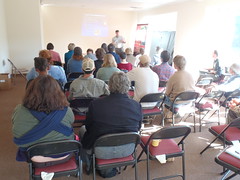Testing out the solar dehydrator with okra, tomatoes, peppers, and a thermometer:
Pictures of Gretchen Quarterman with the solar dehydrator
by John S. Quarterman for Okra Paradise Farms, Lowndes County, Georgia, 4 August 2012.
-jsq
Testing out the solar dehydrator with okra, tomatoes, peppers, and a thermometer:
Pictures of Gretchen Quarterman with the solar dehydrator
by John S. Quarterman for Okra Paradise Farms, Lowndes County, Georgia, 4 August 2012.
-jsq
The sun shines through the window into the lower box, heating air that rises through the upper box, dehydrating fruits and vegetables on the racks. That's the theory; we'll see if it works. Idea shamelessly stolen from Raven Waters; I figure it's his fault if it doesn't work. 🙂
Gretchen Quarterman placing racks in the solar dehydrator
Pictures by John S. Quarterman for Okra Paradise Farms, Lowndes County, Georgia, 3 August 2012.
-jsq
Terry Davis picking corn:
Terry Davis picking corn
Pictures by John S. Quarterman for Okra Paradise Farms, Lowndes County, Georgia, 7 July 2012.
Okra, potato, pepper, plus cornbread muffins and collard seeds:
Gretchen picks peppers every day, and right now she's baking pepper muffins to take to Valdosta Farm Days at the historic Lowndes County Courthouse. Brown Dog and Yellow Dog helping:
Brown Dog and Yellow Dog helping Gretchen Quarterman pick peppers.
Pictures by John S. Quarterman for Okra Paradise Farms, Lowndes County, Georgia, 5 July 2012.
-jsq
 Does the jar grow around them?
Does the jar grow around them?
Here’s the video:
Planting Pickles
Video by John S. Quarterman of Gretchen Quarterman planting cucumbers
at Okra Paradise Farms, Lowndes County, Georgia, 16 April 2012.
-jsq
Here’s a slideshow: Continue reading
“We were very much surprised by our findings. Until now, itThe toxicity of the corn itself may have been a surprise, but not that of Roundup:has been thought almost impossible for Bt proteins to be toxic to human cells. Now further investigations have to be conducted to find out how these toxins impact the cells and if combinatorial effects with other compounds in the food and feed chain have to be taken into account,” says Gilles-Eric Séralini from the University of Caen, who supervised the experiments. “In conclusion, these experiments show that the risks of Bt toxins and of Roundup have been underestimated.”
These findings are in accordance with several other investigations highlighting unexpected health risks associated with glyphosate preparations.Previous studies, including ones by Dr. Séralini, already showed exposure to glysophate (the active ingredient in Roundup) to be “a risk factor for developing Non-Hodgkin lymphoma”, and to be toxic to human umbilical, placental, and placental cells with a that “is far below agricultural recommendations and corresponds to low levels of residues in food or feed.” In Argentina, Prof. Andrés Carrasco has demonstrated birth defects in amphibians and there is increasing evidence of human birth defects.
Regarding Monsanto’s GM corn itself, we already knew it causes liver and kidney damage in rats (later reverified using Monsanto’s own data), and chickens fed feed including Monsanto corn show abnormal gene expression.
Now we have even more hard evidence of the toxicity of Monsanto’s GM corn and of Monsanto’s Roundup. The journal article is available through Wiley online.
-jsq
Stephanie Garlow wrote for Global Post 1 November 2011, McDonald’s failure in Bolivia: The country closed its stores and left Bolivia in 2002. Why couldn’t it succeed there?
It’s the country that turned its back on McDonald’s.Here’s the movie trailer. Yes, it’s in Spanish, but I think you’ll get the general idea from the pictures without needing to follow the dialog. Or here’s another version with even less dialog and some English subtitles. Continue reading
The fast food giant added the traditional llajwa sauce to its classic patties, but still Bolivians weren’t conviced.
So after five years, McDonald’s closed its eight branches and left the country in 2002.
Now a new documentary, “¿Por qué quebró McDonald’s en Bolivia?”, explores why McDonald’s failed. Filmmaker Fernando Martinez focuses on social and cultural aspects to explain the company’s lack of success. “Culture beat a transnational, globalized world,” he said.
 realized nobody else was going to hold a conference
about growing local in the characteristic soils and climate
and with the characteristic foods and culture of
south Georgia, so
okravores met in Tifton
and learned about everything from controling insect to which breeds of cows
produce the best organic milk.
Raven demonstrated
you can make cheese in south Georgia
and Gretchen
demonstrated preserving beautyberry and other jams and jellies,
along with many other interesting talks and demonstrations, and good food.
The South Georgia Growing Local Conference is back,
this time near Reidsville, in January.
realized nobody else was going to hold a conference
about growing local in the characteristic soils and climate
and with the characteristic foods and culture of
south Georgia, so
okravores met in Tifton
and learned about everything from controling insect to which breeds of cows
produce the best organic milk.
Raven demonstrated
you can make cheese in south Georgia
and Gretchen
demonstrated preserving beautyberry and other jams and jellies,
along with many other interesting talks and demonstrations, and good food.
The South Georgia Growing Local Conference is back,
this time near Reidsville, in January.
When:
Saturday, Jan. 14, 2012, 9-5
UGA’s Vidalia Onion & Vegetable Research Center, between Lyons & Reidsville, Ga. & Red Earth Farm, ReidsvilleWhat: Continue reading